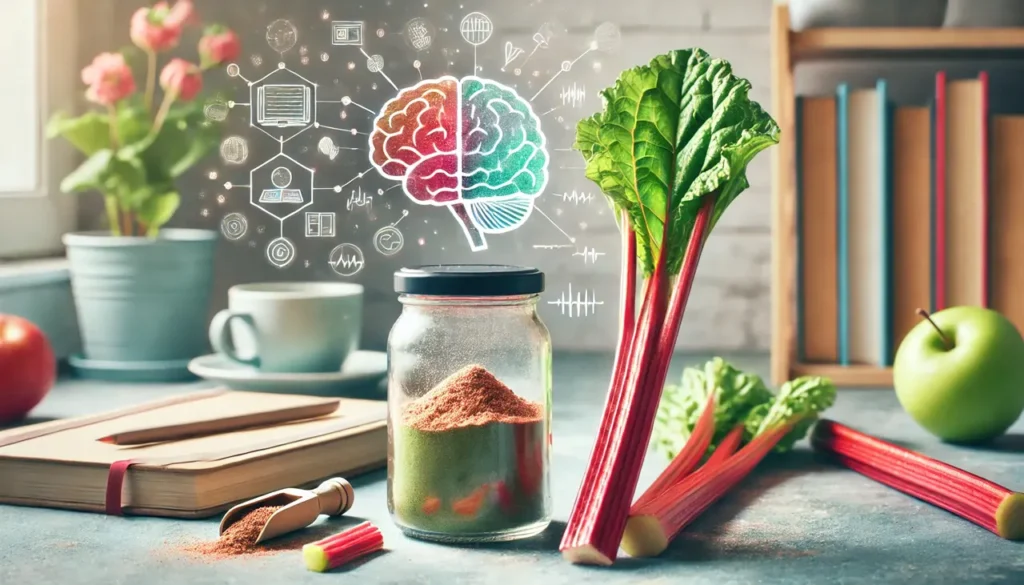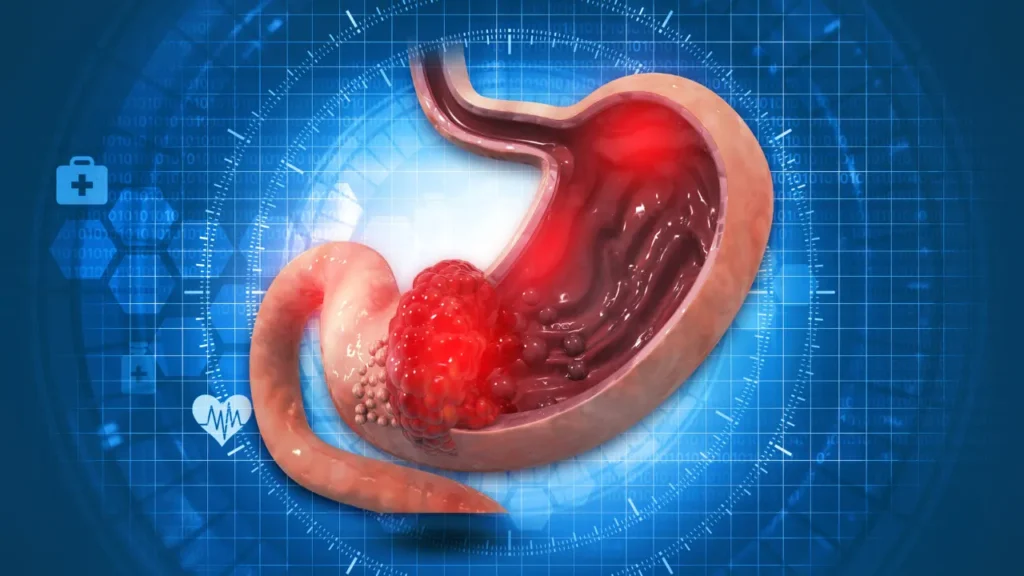Rhubarb (Rheum rhabarbarum) is a perennial plant that has gained popularity not only as a culinary ingredient but also as a potential nootropic supplement. Traditionally, rhubarb has been used in herbal medicine, particularly in Asia, where its various parts have been valued for their medicinal properties. Recent scientific interest in rhubarb has led to investigations into its cognitive-enhancing effects, with various studies suggesting that certain active compounds within the plant may contribute to improved brain function. This article explores the potential nootropic benefits of rhubarb, its key active ingredients, the appropriate dosage, possible side effects, drug interactions, and important considerations for safe usage.
You May Also Like:
Foxglove: Benefits, Dosage, Side Effects, Drug Interactions, and Other Important Information
Red Raspberry: Benefits, Dosage, Side Effects, Drug Interactions, and Other Important Information
Source of Rhubarb
Rhubarb is primarily cultivated for its edible petioles, which are the thick, fleshy stalks of the plant. It grows in temperate regions, thriving in well-drained, fertile soils. While the leaves of rhubarb contain high levels of oxalic acid and are toxic, the petioles are often used in cooking and baking, particularly in desserts, jams, and jellies.
Rhubarb has a long history of use in traditional Chinese medicine, where it is known as “da huang.” It is valued for its purgative properties, believed to help with digestive disorders and promote overall health. In modern herbal medicine, rhubarb extracts are increasingly used as dietary supplements, marketed for their potential benefits, including antioxidant properties, digestive support, and cognitive enhancement.
The roots of rhubarb are often the most concentrated source of bioactive compounds, which can be extracted to create supplements. These extracts are typically available in various forms, including capsules, powders, and tinctures, allowing consumers to incorporate rhubarb into their health regimens easily.
Chemistry of Rhubarb
Rhubarb’s pharmacological properties are attributed to its rich composition of bioactive compounds, particularly polyphenols, anthraquinones, flavonoids, and organic acids.
- Polyphenols: Rhubarb contains a variety of polyphenolic compounds, including flavonoids and phenolic acids, which are known for their antioxidant properties. These compounds scavenge free radicals and mitigate oxidative stress, which is critical for maintaining brain health and preventing cognitive decline. Notable polyphenols in rhubarb include quercetin and kaempferol, both of which have been linked to anti-inflammatory and neuroprotective effects.
- Anthraquinones: One of the most studied groups of compounds in rhubarb is anthraquinones, which include compounds like emodin, rhein, and chrysophanol. These compounds have been shown to exert neuroprotective effects by modulating neuroinflammation and oxidative stress pathways in the brain. They may also enhance cognitive function by promoting neuronal survival and reducing apoptosis.
- Flavonoids: Flavonoids in rhubarb contribute to its nootropic potential through their antioxidant effects and ability to enhance blood flow to the brain. By improving circulation, these compounds may support cognitive function and mental clarity. They are also believed to influence neurotransmitter activity, which could enhance mood and cognitive performance.
- Organic Acids: Rhubarb is rich in organic acids, including citric and malic acids, which play a role in the plant’s overall bioactivity. These acids may influence metabolic processes and contribute to rhubarb’s antioxidant capacity.
The complex interplay of these bioactive compounds in rhubarb creates a diverse pharmacological profile, offering potential benefits for brain health and cognitive performance.
Physiological Mechanisms and Nootropic Potential
The nootropic potential of rhubarb is primarily linked to its antioxidant, anti-inflammatory, and neuroprotective properties. Several physiological mechanisms contribute to these effects:
- Antioxidant Activity: Oxidative stress is a significant contributor to cognitive decline and neurodegenerative diseases. The polyphenols and anthraquinones in rhubarb work synergistically to neutralize free radicals and reduce oxidative damage to neuronal cells. This action can help preserve cognitive function, memory, and attention as individuals age.
- Anti-inflammatory Effects: Chronic inflammation in the brain has been associated with various cognitive disorders, including Alzheimer’s disease. Rhubarb’s bioactive compounds may inhibit the production of pro-inflammatory cytokines and promote the release of anti-inflammatory mediators, thereby reducing neuroinflammation. This could enhance cognitive performance and protect against age-related cognitive decline.
- Neuroprotection: The anthraquinones in rhubarb exhibit neuroprotective effects by promoting neuronal survival and preventing apoptosis. By enhancing neuronal health, rhubarb may improve cognitive function and resilience against neurodegenerative diseases.
- Enhanced Circulation: Flavonoids in rhubarb may improve blood flow to the brain, ensuring that neurons receive adequate oxygen and nutrients. This increased cerebral blood flow could enhance cognitive function, including improved focus, memory, and mental clarity.
- Mood and Stress Regulation: Some studies suggest that rhubarb may have adaptogenic properties, helping the body adapt to stress and potentially improving mood. By regulating neurotransmitter activity, rhubarb could create an environment conducive to optimal cognitive performance.
While the existing research on rhubarb’s nootropic effects is promising, it is essential to note that much of the evidence comes from animal studies or in vitro experiments. More rigorous human clinical trials are needed to confirm rhubarb’s nootropic potential.

Dosage and Usage for Nootropic Benefits
As with many herbal supplements, determining the appropriate dosage for rhubarb can be challenging due to variability in formulation, concentration of active compounds, and individual responses. However, general guidelines can provide a framework for safe usage:
- General Dosage Range: The recommended dosage of rhubarb root extract typically ranges from 200 to 500 mg daily. This dosage is considered safe for most individuals and provides the antioxidant and anti-inflammatory benefits associated with rhubarb.
- Extract Dosage: When using concentrated rhubarb extracts, the dosage may vary based on the concentration of active compounds. A common range for standardized extracts, which ensure a specific amount of bioactive ingredients, is 150 to 300 mg daily.
- Nootropic-Specific Dosage: A higher dosage within the safe range (closer to 400 mg per day) may be appropriate for those seeking cognitive benefits. Individuals are advised to start with lower doses and gradually increase as needed, monitoring their response to the supplement.
- Forms of Supplementation: Rhubarb supplements are available in various forms, including capsules, powders, and tinctures. Each form may have different bioavailability, so individuals should consider their preferences and needs when selecting a product.
It is crucial for individuals to consult with a healthcare professional before starting any new supplement regimen, especially if they have pre-existing health conditions or are taking medications.
Side Effects and Safety
Rhubarb is generally considered safe for most individuals when consumed in moderation. However, there are potential side effects and safety concerns associated with its use:
- Gastrointestinal Issues: The most commonly reported side effects of rhubarb supplementation include digestive discomfort, such as nausea, diarrhea, and abdominal cramps. These effects may occur, particularly with higher doses or prolonged use.
- Toxicity of Leaves: Rhubarb leaves contain high levels of oxalic acid and anthraquinones, making them toxic if ingested. Only the petioles should be consumed or used in supplements, as the leaves can lead to serious health complications, including kidney damage.
- Kidney Health: Due to its oxalate content, excessive consumption of rhubarb, particularly in high doses or over an extended period, may pose risks to kidney health. Individuals with pre-existing kidney conditions should avoid rhubarb supplementation or consult a healthcare provider before use.
- Drug Interactions: Rhubarb may interact with certain medications, particularly those affecting blood pressure or blood sugar levels. When using rhubarb supplements, individuals taking antihypertensive or antidiabetic medications should closely monitor their blood pressure and blood sugar levels.
- Pregnancy and Breastfeeding: Limited research is available on the safety of rhubarb during pregnancy or breastfeeding. Therefore, it is generally advised that pregnant or nursing individuals avoid using rhubarb supplements unless directed by a healthcare professional.

Potential Interactions with Drugs and Supplements
Given its bioactive compounds, rhubarb may interact with various medications and supplements, which is crucial for users to consider before adding it to their regimen:
- Blood Thinners: Rhubarb’s potential effects on coagulation could enhance the effects of anticoagulant medications like warfarin, increasing the risk of bleeding. Individuals on blood-thinning medications should exercise caution and consult a healthcare professional before using rhubarb.
- Antihypertensive Medications: Rhubarb may have a mild blood-pressure-lowering effect, which could synergize with antihypertensive drugs. Individuals taking these medications should monitor their blood pressure closely to avoid hypotension.
- Antidiabetic Medications: Rhubarb may lower blood sugar levels, potentially interacting with medications used to manage diabetes. Users should be vigilant about their blood sugar levels and consult a healthcare provider if they are on such medications.
- Other Nootropics and Supplements: While no direct studies have focused on rhubarb’s interactions with other nootropic substances, users should approach combining rhubarb with other cognitive enhancers cautiously. The synergistic effects of various compounds can either enhance or counteract cognitive benefits.
Risks for Individuals with Certain Health Conditions
While rhubarb is safe for many, some individuals should avoid or use caution when considering supplementation:
- Kidney Disorders: Due to the oxalate content in rhubarb, individuals with pre-existing kidney conditions or a history of kidney stones should avoid rhubarb supplementation to reduce the risk of exacerbating kidney issues.
- Digestive Disorders: People with gastrointestinal disorders, such as irritable bowel syndrome (IBS) or inflammatory bowel disease (IBD), may experience exacerbated symptoms when using rhubarb supplements.
- Pregnancy and Breastfeeding: The safety of rhubarb supplementation during pregnancy and breastfeeding has not been established. Pregnant or nursing individuals should avoid rhubarb unless directed by a healthcare provider.
- Bleeding Disorders: Individuals with bleeding disorders or those on anticoagulant therapy should approach rhubarb with caution due to its potential effects on blood coagulation.
Conclusion
Rhubarb is a versatile plant with potential nootropic benefits thanks to its rich composition of bioactive compounds. While preliminary research suggests that rhubarb may enhance cognitive function and protect brain health through its antioxidant, anti-inflammatory, and neuroprotective properties, further studies are needed to understand its effects in humans fully.
When considering rhubarb supplementation, adhering to appropriate dosage guidelines and being aware of potential side effects, drug interactions, and specific health conditions that may warrant caution is essential. Consulting a healthcare professional before starting any new supplement is crucial to ensure safe and effective use. With careful consideration, rhubarb may be a valuable addition to a holistic approach to brain health and cognitive enhancement.

References:
- Health Benefits of Rhubarb. Retrieved from: https://www.webmd.com/diet/health-benefits-rhubarb
- Health Benefits of Rhubarb. Retrieved from: https://www.health.com/rhubarb-benefits-8646767
- 9 Rhubarb Benefits You Need to Know. Retrieved from: https://www.tasteofhome.com/collection/rhubarb-benefits/
- Is Rhubarb Good for You? All You Need to Know. Retrieved from: https://www.healthline.com/nutrition/rhubarb
Important Note: The information contained in this article is for general informational purposes only, and should not be construed as health or medical advice, nor is it intended to diagnose, prevent, treat, or cure any disease or health condition. Before embarking on any diet, fitness regimen, or program of nutritional supplementation, it is advisable to consult your healthcare professional in order to determine its safety and probable efficacy in terms of your individual state of health.
Regarding Nutritional Supplements Or Other Non-Prescription Health Products: If any nutritional supplements or other non-prescription health products are mentioned in the foregoing article, any claims or statements made about them have not been evaluated by the U.S. Food and Drug Administration, and such nutritional supplements or other health products are not intended to diagnose, treat, cure, or prevent any disease.


